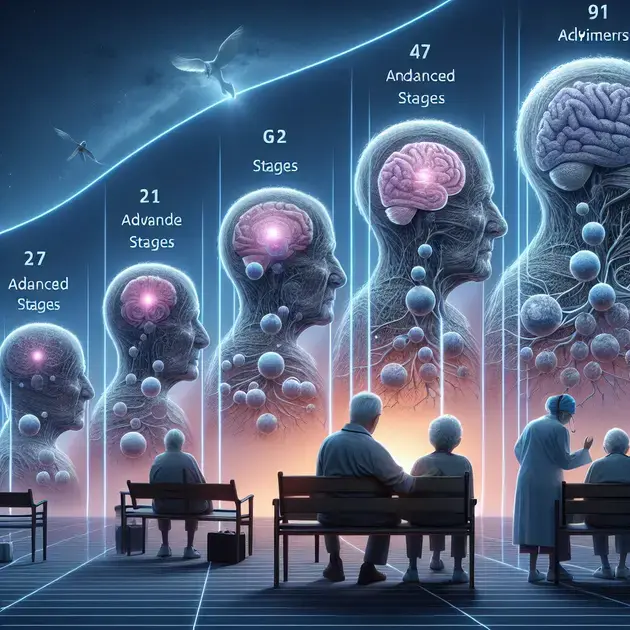Alzheimer’s Disease is a progressive brain disorder that affects memory, thinking skills, and behavior. According to the Alzheimer’s Association, it is the most common cause of dementia, accounting for 60-80% of cases. Currently, there is no cure for Alzheimer’s Disease, with treatments focusing on managing the symptoms and improving quality of life for patients and their families.
Understanding Alzheimer’s Disease is crucial in order to provide the best care and support for those affected by it. This informative guide aims to shed light on the causes, symptoms, diagnosis, and available treatments for Alzheimer’s Disease, as well as offering practical tips for caregivers and families navigating the challenges associated with this condition.

**Understanding Alzheimer’s Disease: The Basics**
Introduction to Alzheimer’s Disease
Alzheimer’s Disease is a progressive neurological disorder that affects the brain, leading to memory loss and cognitive decline. To understand Alzheimer’s Disease, it’s essential to grasp its impact on individuals and their families. One of the best ways to learn more about this condition is to access reliable sources such as the Alzheimer’s Association website.
The Alzheimer’s Association provides comprehensive information about the disease, including its causes, risk factors, and stages. By exploring their website, individuals can gain a deeper insight into the basics of Alzheimer’s Disease and how it affects the brain over time.
To start your journey of understanding Alzheimer’s Disease, visit the Alzheimer’s Association website at www.alz.org. There, you will find resources, articles, and tools to enhance your knowledge and awareness of this condition.
By educating yourself about Alzheimer’s Disease, you can better support loved ones who may be impacted by the condition. Knowledge is key in navigating the challenges that come with Alzheimer’s Disease and ensuring the best possible care for those affected.
Common Misconceptions about Alzheimer’s Disease
There are several misconceptions surrounding Alzheimer’s Disease that can lead to misunderstandings and stigma. It’s vital to address these misconceptions to promote accurate information and awareness about the condition.
One common misconception is that Alzheimer’s Disease only affects older individuals. While age is a significant risk factor, early-onset Alzheimer’s can occur in individuals under the age of 65. Understanding this fact is crucial in recognizing the diverse impact of the disease.
Another misconception is that Alzheimer’s Disease is a normal part of aging. In reality, Alzheimer’s is a specific and challenging neurological condition that requires specialized care and support. By dispelling these misconceptions, we can foster a more informed and compassionate understanding of Alzheimer’s Disease.
To learn more about common misconceptions and facts about Alzheimer’s Disease, you can refer to reputable sources such as the National Institute on Aging’s Alzheimer’s Disease Education and Referral (ADEAR) Center website.
By addressing misconceptions and promoting accurate information, we can create a more supportive and knowledgeable community for individuals impacted by Alzheimer’s Disease.
Impact of Alzheimer’s Disease on Families
Alzheimer’s Disease not only affects individuals diagnosed with the condition but also has a profound impact on their families and caregivers. Understanding the emotional, financial, and practical implications of Alzheimer’s Disease is essential in providing holistic support to those affected.
Families of individuals with Alzheimer’s often experience increased stress, emotional strain, and financial burden due to the demands of caregiving. It’s crucial to acknowledge these challenges and seek out resources to alleviate the impact on family members.
Support groups, such as those offered by the Alzheimer’s Foundation of America, can provide a valuable network for families navigating the complexities of caring for a loved one with Alzheimer’s Disease. These groups offer emotional support, resources, and shared experiences that can help families cope with the challenges they face.
By recognizing the multifaceted impact of Alzheimer’s Disease on families, we can work towards implementing comprehensive support systems that address the diverse needs of both individuals with the condition and their caregivers.
For more information on the impact of Alzheimer’s Disease on families and available support services, you can visit the Alzheimer’s Foundation of America website at www.alzfdn.org.

**Understanding the Progression of Alzheimer’s Disease**
Early Stages
During the early stages of Alzheimer’s disease, individuals may experience mild memory loss and cognitive difficulties. They might have trouble remembering recent events, names, or familiar faces. This stage can be challenging for both the affected individual and their loved ones as the changes may be subtle but noticeable.
As the disease progresses, these memory lapses can become more frequent and severe. The individual may also start to exhibit changes in mood and behavior, such as increased confusion, irritability, or anxiety. Daily tasks and routines may become more challenging to complete without assistance.
It is important for family members and caregivers to provide support and understanding during this stage. Creating a safe and structured environment can help the individual feel more secure and at ease. Encouraging engagement in activities that stimulate the mind, such as puzzles or art projects, can also be beneficial.
Monitoring the progression of symptoms and discussing them with healthcare providers can help in determining the best course of action for managing the early stages of Alzheimer’s disease.
Moderate Stages
In the moderate stages of Alzheimer’s disease, the symptoms become more pronounced and the individual may require more extensive care and support. Memory loss and cognitive impairments worsen, making it challenging for the affected person to communicate effectively or perform basic tasks.
During this stage, individuals may experience difficulty recognizing familiar people or places, which can lead to feelings of disorientation and frustration. Caregivers play a crucial role in providing assistance with daily activities such as bathing, dressing, and meal preparation.
Behavioral symptoms such as wandering, aggression, or sundowning (increased confusion in the late afternoon and evening) may also occur during the moderate stages of the disease. It is essential for caregivers to seek guidance from healthcare professionals on how to manage these behaviors effectively.
Creating a structured routine and maintaining a calm and supportive environment can help individuals with Alzheimer’s disease feel more secure and comfortable as they navigate the challenges of the moderate stages of the condition.
Advanced Stages
As Alzheimer’s disease progresses to the advanced stages, individuals experience severe cognitive decline and physical impairments. They may require round-the-clock care and assistance with all aspects of daily living, including eating, toileting, and mobility.
Communication becomes extremely limited, and individuals may lose the ability to speak or recognize loved ones. Behavioral symptoms can intensify, leading to increased agitation, aggression, or apathy. Caregivers must focus on providing compassionate and personalized care to meet the complex needs of individuals in the advanced stages of Alzheimer’s disease.
Medical interventions and palliative care may be necessary to manage symptoms and ensure the comfort and well-being of the affected person. It is crucial for families to work closely with healthcare providers to create a comprehensive care plan that addresses the physical, emotional, and social needs of individuals in the advanced stages of Alzheimer’s disease.
Support groups and respite care services can also offer valuable support to caregivers as they navigate the challenges of caring for a loved one in the advanced stages of Alzheimer’s disease.
**
Conclusion
**
Understanding the progression of Alzheimer’s disease is crucial for both individuals affected by the condition and their caregivers. In the early stages, where mild memory loss and cognitive difficulties are present, providing a supportive and structured environment can greatly benefit the affected individual. Engaging in activities that stimulate the mind and seeking guidance from healthcare providers are essential in managing the symptoms effectively during this phase.
Transitioning into the moderate stages, where symptoms become more pronounced, caregivers play a vital role in assisting with daily activities and managing behavioral changes such as wandering or aggression. By creating a calm and supportive atmosphere and adhering to a structured routine, individuals with Alzheimer’s can feel more secure and comfortable despite the challenges they face in this stage.
As the disease progresses to the advanced stages, characterized by severe cognitive decline and increased physical impairments, round-the-clock care and personalized assistance become imperative. Communication limitations and intensified behavioral symptoms require a compassionate approach from caregivers, alongside medical interventions and palliative care to ensure the well-being and comfort of the affected individual. Collaboration with healthcare providers to develop a comprehensive care plan that addresses all aspects of the person’s needs is vital at this stage, while seeking support from support groups and respite care services can provide caregivers with valuable assistance in navigating the complexities of caring for a loved one with advanced Alzheimer’s disease.